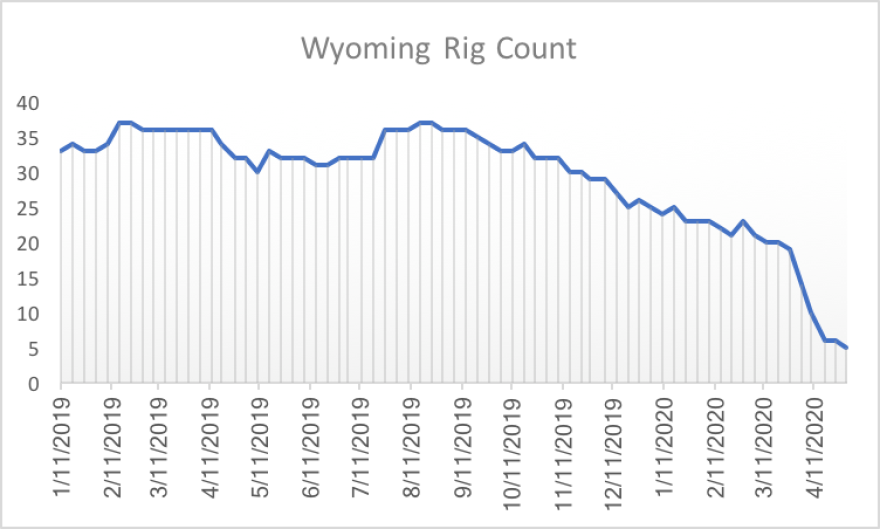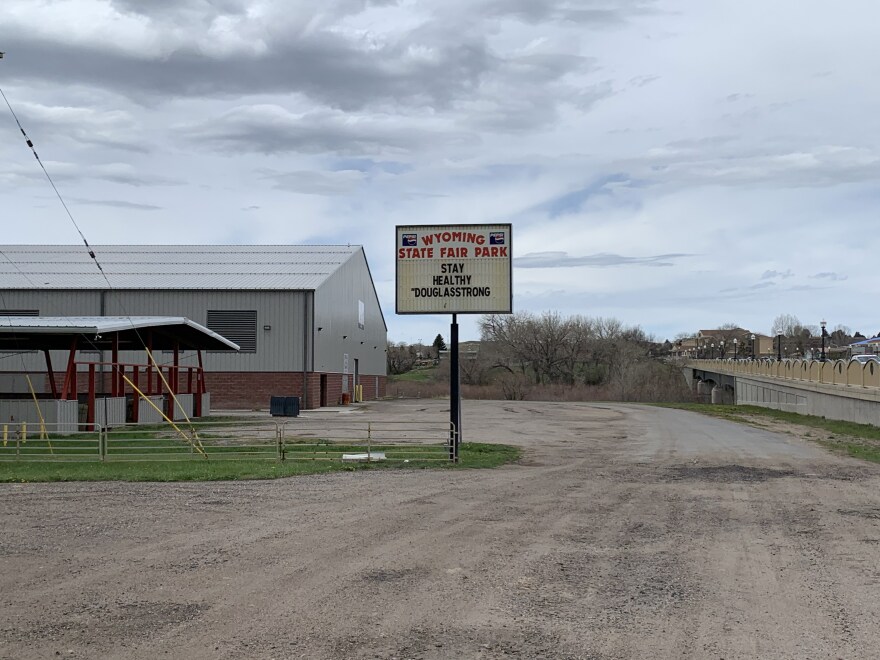The sun is beating down on a nearly empty gravel plot. Just a few weeks ago, trailers owned by oil field and pipeline workers lined this man camp.
A mother, who asked not to be named, is packing up her trailer to leave too as her daughters play nearby. Her family came here so her husband could work on a pipeline.
"We came here from Oklahoma because the oil field basically crashed there. So, we came down here. I think we've been here since January," she said.
But with the latest oil crash, they're back on the road. Her husband's currently scouting another job in North Dakota. She didn't think they would be leaving Wyoming so soon.
"I didn't really expect it, but that's the oil field."

Converse County is the number one producer of crude oil in Wyoming. The county relies on oil and gas for about 70 percent of its annual revenue. But with the oil price collapse, the majority of rigs have disappeared leaving at least 1700 oil field workers without a job in Wyoming since March 1.
Walking through the man camp, County Commissioner Robert Short said it's starting to feel like a ghost town here.
"You would normally see probably 30 to 50 semi-trucks with frac-sand trailers or water haulers moving up and down that road during different points of the day," he said. "Today, zero."
The drop in all oil field activity has been hard on local businesses. Short owns several himself. He's already had to lay-off 13 employees due to a 95 percent drop in revenue at his hotel-restaurant. It's not just him.
"As WTI falls down, so does all of the foundation for the economics in this small community," said Short, referencing West Texas Intermediate, a benchmark in oil pricing.

Hotels are seeing crews up and leave, forcing lay-offs. Supply stores are seeing revenue drop. Mechanics like Phad Alexander are feeling it too. He owns Bud's Field Service and Truck Repair.
"About five weeks ago, it was just like somebody flipped the switch and the phone never rang," he said.
But now, Alexander's large open-air shop is empty save for one orange semi-trailer cab left behind for maintenance.
"We had some of our longtime customers... they stopped in here one last time and said 'yeah, we're going home, we're going to park the truck,'" Alexander said. "We had customers that were staying here from all over the United States and they're just done."
He has already had to lay-off the only two employees he had. The shop did qualify for a paycheck protection loan, but there's not much work to be done anymore.
"What does that mean for your bottom line?" I asked.
"There's no bottom to it right now. I mean, we probably did $10 to $20,000 a week. And we're lucky to do $300 a week now," he said.
Alexander is figuring out how to afford a pre-existing loan on his shop and another for a recently purchased service truck.
Landlords are also losing tenants as laid off oil-field and coal workers move to the next job. Ron McNare owns 29 rental units and a construction business. He said renters didn't even tell him they were leaving.
"They normally do. But when their jobs done, they're gone," he said. "You know, so there's no notice they're moving on."
McNare said the town was packed just a couple months ago and there were no rental openings. Now, everyone has them.
In 2019, Converse County actually saw record property tax valuation. But County Commissioner Jim Willox said that doesn't necessarily mean record tax collection. That will depend on a company's ability to pay and avoid bankruptcy.
"We'll get a good handle on, you know what the company's ability to pay their legitimate tax bill is, then as you look at the other side of it, 2020 is looking like it's not going to be real good," he said.
Joel Schell, the Converse County Treasurer, said March sales tax collection actually went up from the prior month which he said was unexpected.
May 10 is the deadline for the second half of 2019 property tax payments. Schell said the county will know more how many ad valorem taxes are collected soon.

To tighten its belt, Willox said the county has placed a freeze on hiring, paused construction of new courtrooms and offices, and expects budget cuts to come.
"Have we weathered them here in Wyoming and Converse county before? Absolutely. But I don't know if we have weathered a total drawback like this one," he said.
The county is hopeful the 400 megawatt Cedar Springs Wind Project will provide an economic boost. The NextEra development projects to boost its workers from around 40 to a potential peak near 300 by July.
For now, it's a waiting game for the county: to see how much money the county will receive through taxes and federal aid and how long it will take for the industry it depends on to rebound.
Have a question about this story? Contact the reporter, Cooper McKim, at cmckim5@uwyo.edu.









